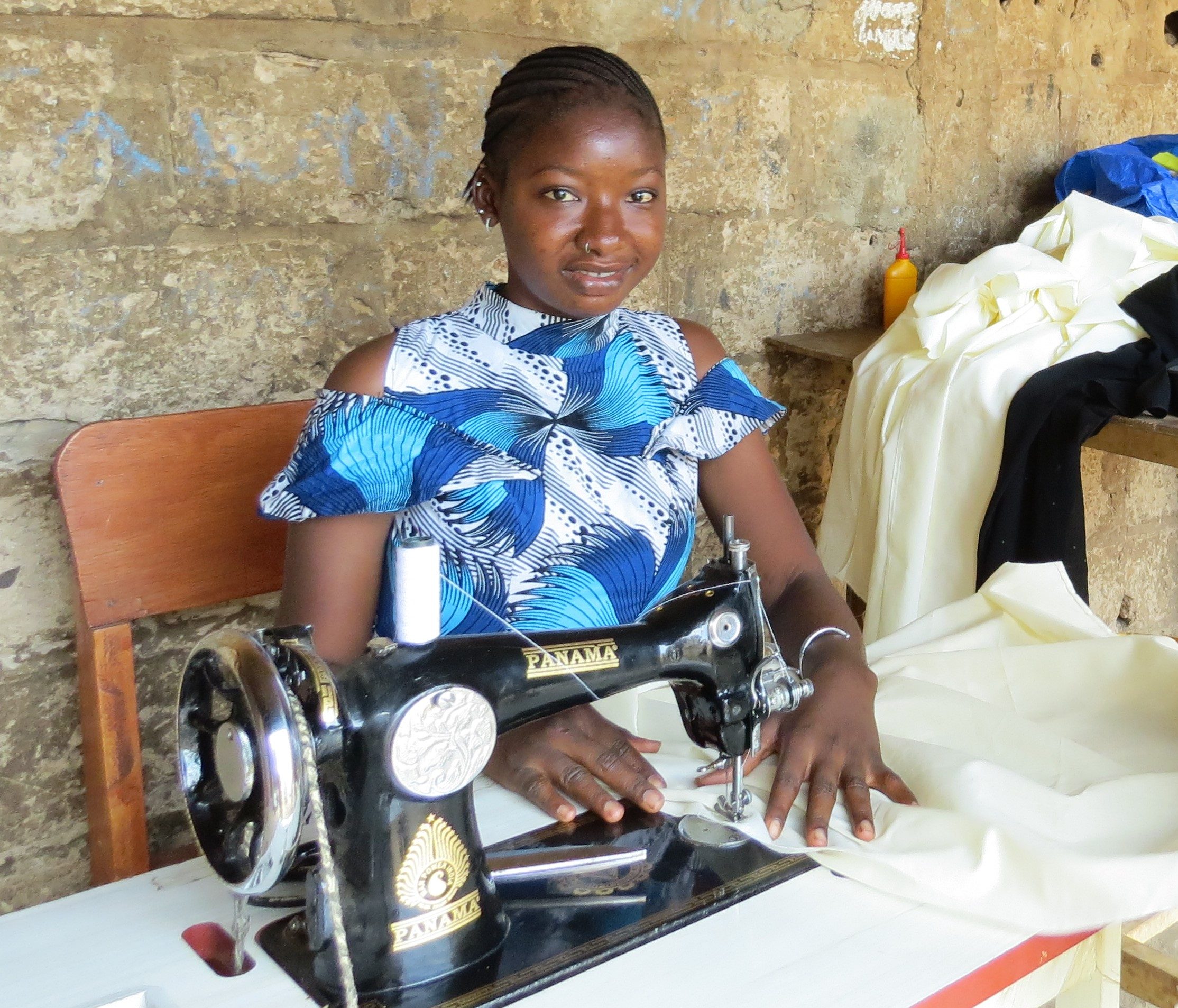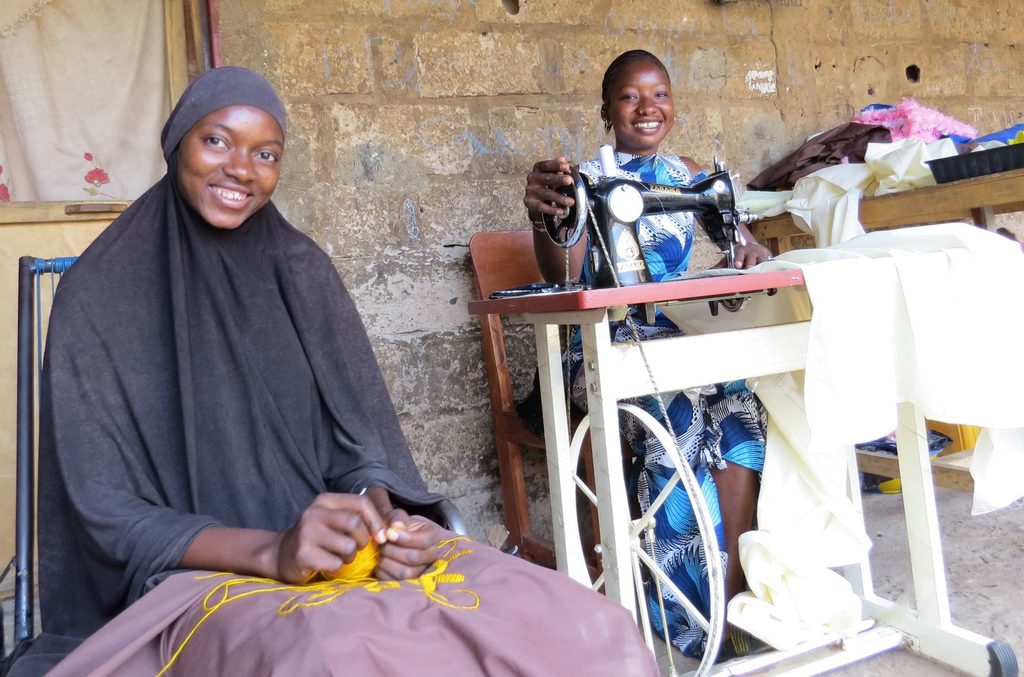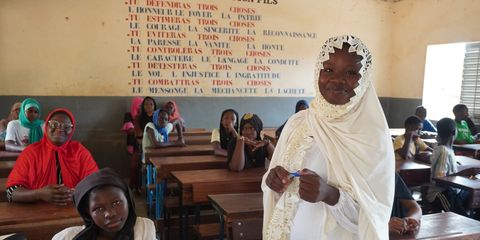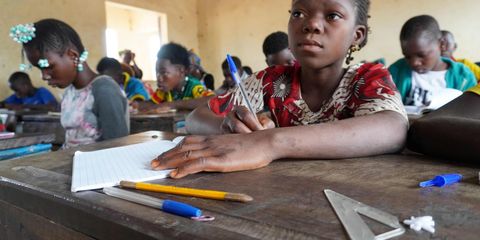Coumba, a young entrepreneur made for sewing business success
The World Economic Forum estimates it will take 131 years to reach gender equality. But we say, that’s just NOT good enough. Coumba's plan to Beat the Clock is to run her own business and improve economic equality by training other young women.

Coumba using her sewing machine. © Abdourahmane Coulibaly
Coumba, is a 20-year-old young woman from Mali who dropped out of school without qualifications. She was living at home with her mother and 5 younger siblings and things were not very easy.
Starting a sewing business
After dropping out of school Coumba was looking for a new path to take. The opportunity arose to take part in a sewing programme in her community, so she eagerly joined.
“We were the first group of trainees, there were 12 of us aged from 16 to 24. The training took a year and a half, and we learnt pattern cutting, sewing and embroidery,” Coumba explains. “After the training, we received a startup kit of a sewing machine, table, ribbons, needles and material.”
With these resources, Coumba set up her own sewing and tailoring business and now sews items to order. “I use the WhatsApp network to share my work and my friends also do the same. That’s how I make myself known. When I invest 17,000 CFA (€25) to purchase material to make sheets, I can make a profit of 20,000 CFA (€30) after resale. I also do a lot of children’s sewing.”
Coumba’s mother Sitan says she has noticed a change in her daughter since she started sewing. “She is now the one who takes care of almost everything today. She looks after me and her siblings. I don’t have to worry anymore.”
Sitan tells us that thanks to Coumba’s income, the family are no longer struggling to survive. “There is a big difference between our condition before and today. Having an activity that generates an income has been a huge help to us. When she sells the sheets she makes, the profits help takes care of the needs of her brothers and sister.”
“I want to become more competent in cutting skills and hope to fully master the sewing of women’s clothing.”
Coumba
Coumba‘s ambition
Coumba now wants to share her knowledge with other girls and young women living in vulnerable situations. She currently has a 16-year-old apprentice Batoma who she is passing her skills on to.

“I saw Coumba doing sewing and embroidery and I asked her if I could come and help and also learn. This means I don’t have to stay at home all day doing nothing. I love embroidery, it’s like a hobby for me. I enjoy making small things and giving them as gifts to my loved ones. Coumba teaches me many new things,” Batoma tells us.
“In the past, I watched my mother doing embroidery. When my father passed away I came here to live with my aunt. I haven’t been in school for 2 years, but my aunt has promised to re-enrol me next year. I want to go back to school because I would like to be a soldier or a firefighter,” shares Batoma.
Likes Coumba dozens of girls who attended the training programme have job opportunities, are determined and want to continue honing their skills.
“I want to continue my apprenticeship with a master craftsman because during the training there were not enough sewing machines for everyone. I want to become more competent in cutting skills and hope to fully master the sewing of women’s clothing.” Coumba said.
Bright future project
Mali’s population is one of the youngest in the world, which presents both enormous potential as well as many challenges. Fewer jobs are created in the economy than are needed to keep pace with the growing population, leading to high levels of youth unemployment. Young people are also unable to access relevant skills training needed to secure decent work. Every year, thousands of Malian youth are prompted to leave their homeland and migrate to other countries in search of new opportunities, often putting themselves at risk of dangers including exploitation, homelessness and abuse.
Funded by the Italian Ministry of the Interior in collaboration with Plan International and Action Aid International, the Bright Future (Avenir Brillant) project was launched in October 2020 and is being implemented in the regions of Bamako and Kayes by ENDA (Environment and Development) Mali and AME (Malian Association of the Expelled).
The project offers young people with an alternative to irregular migration through social and economic opportunities, as well as strengthening protection mechanisms for child and youth migrants, those in transit or those who have recently returned home.
Beat the Clock
A girl gets no say, a girl gets no rights, a girl must ‘play to type’ – it’s a story as old as time. But we say, that’s just NOT good enough. The World Economic Forum estimates there will be 131 years until gender equality in the world for girls. That’s why we’re embarking on an unrelenting, collective mission to Beat the Clock; in order to inspire the world to come together, to learn, take action, donate, advocate, champion, speak up and speak out, as an ally to the cause. Every action counts in bringing about equality to all girls, everywhere. We’ll keep fighting until we are all equal.
Categories: Skills and work


